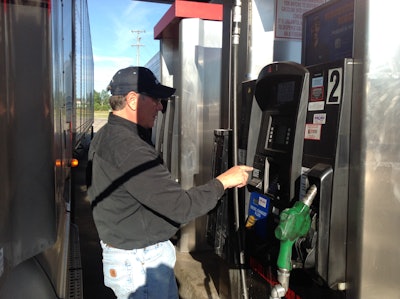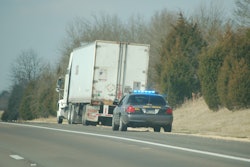The Trucking Law segment is a monthly feature on Overdrive, in which we pose commonly asked questions from truckers and owner-operators to legal experts. In this installment, attorney Paul Taylor addresses common questions regarding lease arrangements between owner-operators and fleets. Find all Trucking Law installments via this link.
 The law says an owner-operator using a carrier’s fuel program is due a prorated rebate when the carrier receives a volume discount.
The law says an owner-operator using a carrier’s fuel program is due a prorated rebate when the carrier receives a volume discount.A written lease between owner-operators and carriers for whom they haul is required by Federal Motor Carrier Safety Administration regulations. The “truth in leasing” regulations are intended to level the playing field between them, partly by requiring a high level of transparency. Here are common owner-operator questions:
May the carrier and I agree to rates on each load?
No. The regulations require that the lease clearly state the compensation to be paid. The lease may require payment by the mile, load, hour or percentage of the load, or even other methods.
Am I entitled to copies of the invoices or rate confirmation sheets for loads I haul?
If you’re paid a percentage of revenue, you’re entitled to copies of the invoices to the carrier’s customers or a computerized document containing what normally appears on an invoice. Or a computerized settlement statement suffices, provided it contains typical freight bill information such as loading location, delivery points, weight, piece count, etc.

You’re not entitled to a copy of the load confirmation sheets, but the carrier may choose to give copies. However, you’re always entitled to review the load confirmation sheets, contracts and rate circulars used to calculate the charges for a load you hauled.
What can the carrier charge back to me?
As a general rule, the carrier may charge you for anything that the lease states can be charged back. Almost all leases provide that the carrier can charge you for fuel charges made to the carrier’s fuel account. Also, the carrier can charge you for a prorated share of public liability and cargo insurance, if the lease provides. If charges for insurance, trailer rent, fuel taxes, etc., are made, then the carrier must provide you with documents to back up the validity of the charge.
The carrier can charge back a valid freight loss or damage claim if the lease allows such, though the lease often limits the chargeback amount. Owner-operators should, where necessary, review their leases, because some leases do not limit the chargeback.
Am I entitled to a portion of any volume fuel discounts paid back to the carrier?
The regulations say the lease must specify who is responsible for the fuel costs, and virtually every lease puts that on the owner-operator. If a fuel vendor pays a volume discount to the carrier, then the cost of fuel has been reduced. A prorated portion of that rebate should be paid back to an owner-operator using the carrier’s fuel-buying program.
What are my rights if the carrier violates the lease or the lease regulations?
You may sue in federal court to enforce the lease regulations and for damages resulting from a violation of them. Those regulations require the carrier to adhere to the lease’s terms. Essentially, such a lawsuit is similar to breach of contract. Arbitration cannot be forced, and attorney fees may be recovered by an owner-operator who is successful in a suit.









